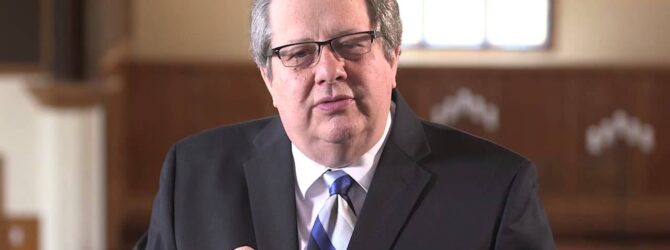
Pentecostal Spirituality: A Passion for the Kingdom
A Review of Pentecostal Spirituality: a Passion for the Kingdom by Steven J. Land. in Journal of Pentecostal Theology. Author: Harvey Cox.
Jesus Christ is the center and the Holy Spirit is the circumference of a distinctive Pentecostal spirituality.
—Steven Land in Amos Yong, Spirit of Love: A Trinitarian Theology of Grace (Waco, TX: Baylor University Press, 2012), 79-80.
About the Author: Steven Jack Land (PhD, Emory University) is President and Professor of Pentecostal Theology at the Pentecostal Theological Seminary in Cleveland, TN, USA.
As a non-Pentecostal Christian, I’ve been extremely enlightened and (even more) exhorted, by this work of historical, spiritual and ecumenical power. This monograph not only achieves its aim in recalling the apostolic affections and apocalyptic hunger that Pentecostalism was birthed from (Azusa), but also sets forth a convincing “revisioning” and “reimagining” of Pentecostalism in a more Trinitarian eschatological mapping out. This reimagining sets Pentecostalism in more of a biblically measured expectation, but also sifts and challenges the Evangelicalism of our day by both clarifying and intensifying the eschatological hope of the Christian, reminding us that the future has already begun by the giving of the Son and the Spirit.
A few notes on the strengths of Land’s “Pentecostal Spirituality”:
1. Pentecostal Theology is Maturing: Most Christians have a very limited understanding of “biblical” Pentecostalism, because most Pentecostals we know aren’t very grounded. Land, along with many other Pentecostal scholars, are remedying that by grounding Pentecostal spirituality in the biblical witness, historical church, and giving the Pentecostal experience a context within a broader theological map. This presents us with a much more matured, and “grown up”, Pentecostal theology, as well as a more biblically tethered spirituality. Land also gives theological weight to the tradition, and rightly connects it to the apostolic period and spirituality, namely, “apocalyptic affections” and “eschatological hunger”.
2. (Re)Connecting the Spirit as the Link to “Last Things”: God always uses certain traditions and theologians to call us back to a more biblical faith and purified expectation, just as He’s always done throughout the Biblical testimony by His prophets, apostles and most importantly, His Son, Jesus the Christ. Land argues that in Christian history, Luther recovers “Justification” (first blessing of salvation), Wesley recovers “Sanctification” (second blessing of salvation), and Pentecostalism recovers “Holy Spirit Baptism” (third blessing of salvation), showing the crises-development understanding of “salvation” as a three-blessing motif in Pentecostalism. By doing this, he argues that Pentecostalism is recovering/restoring the Church’s vital key to accomplishing her mission, worship, witness and testimony in the world – the power and purity provided in the Holy Spirit (Acts 1-2). In doing so, Land clarifies that the Spirit takes center stage in the plan of God in this time, recovering the books of Joel-Luke-Acts for the Church, and teaching us that the “future is now”, as the Kingdom of God has truly, but not totally, broken through into our fallen world.
3. Trinitarian Corrective to Traditional Pentecostalism: Most Christians criticize Pentecostalism for its diminishing of the centrality of Christ, and the cross/resurrection as the climactic point in human/redemptive-historical history. This criticism, in my humble opinion, is merited. Pentecost tends to overshadow the cross/resurrection, instead of properly being born from it. Land, along with other Pentecostals, would argue that “Christ is the center” and the “Spirit is the circumference” of both the Christian’s personal, and the Church’s global, experience. Land also argues that Christ is the force and focus of both the so-called “Four-Fold” Gospel, and His own tradition’s (Church of God-Tennessee), “Five-Fold” Gospel. For him, Christ is “Savior, Sanctifier, Healer, Holy Ghost Baptizer, and Soon-Coming King”. Both these Christ-oriented correctives, along with a reorientation of the Holy Spirit to the over-arching plan of God in history, are very helpful in bringing about a more biblical and Trinitarian faith. This is much welcomed and encouraging.
4. Irenic & Ecumenical: Lastly, the tone and discussion laid out in this book are outstanding and healing for the broader Christian community. For too long, Christian traditions focus on their differences (however small), and neglect their commonalities (however large). While Land differentiates himself from a variety of Christian traditions throughout this monograph (Dispensational, Wesleyan, Reformed, Lutheran, AG Pentecostals, Charismatics, etc.), he does so for clarity, not combatively.
Overall, I would love to see other traditions engage each other in how Land has modeled for us. It allows us to see and engage the much, much bigger Christian story together, stand alongside each other, and see how every Christian is ultimately a Pentecostal in experience (even if not so in name), who has been born of the Spirit, gathered by Him, and sent in His power through the global Pentecost(al) event that has been happening since Acts 2. We truly are the 29th chapter of that book!

